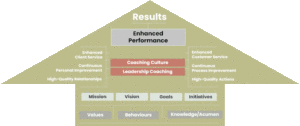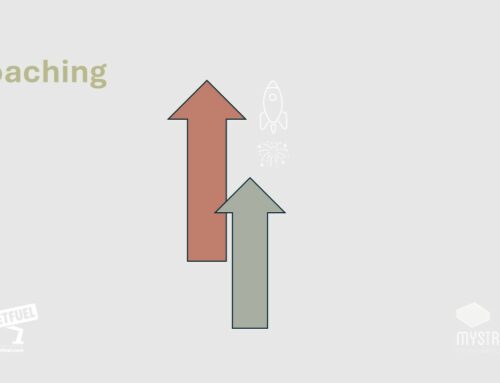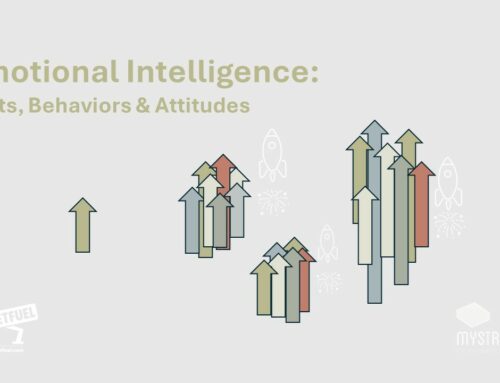
If it isn’t consistent, it isn’t a culture. Make sure you have a Coaching Habit, reminds Leadership & Performance Coach, Davina Greene.
Many managers work in busy companies, in busy industries.
As a manager, part of your role should be to support a cultural transformation to a Coaching Culture that supports quicker learning and growth across all aspects of your business. I know from experience that, without formal intent to embed this process within your own managerial hierarchy, this simply will not happen.
Here, I’ll run through some of the reasons why Coaching discipline – that is to say, a ‘coaching habit’ – is important.
The Importance of Building A Coaching Habit At Work
Consistency of Drive
Businesses perform when everyone is moving together towards a strategic aim or ‘bigger goal’. Whether that comes from the highest level or is devised within your team, people need very regular reminding of those aims as they slowly but surely sink into the day-to-day routine – and, most importantly, regular questioning as to what exactly they are doing to further those aims!
An organization exists because it has clients – without them, there is no organization. They are who we serve, first and foremost (the “Why”). What is the client seeing right now, if we put ourselves in their shoes? How are we better than we were last month, last year? Coaching is the environment for such reflection. Otherwise, we simply shuffle along, doing the same thing today as yesterday – and that’s not true performance.
Regardless of a company’s own specific goals, every company in the world has three main priorities:
- Keep existing clients.
- Expand existing clients.
- Find new clients.
We need great stories for our, for example, Client Relationship Managers to sell to our existing clients, and for our Sales teams to sell to our future clients. If we never look up from the day-to-day mechanics of our work, those stories simply won’t develop.
We cannot let proactivity be sacrificed to necessary reactivity.
Consistency of Meaningful Engagement
The main place that coaching conversation will happen is in a 1-2-1.
Standard process across companies in general is a monthly 1-2-1 for everyone – coaching aside, from a HR perspective it is always best practice to have evidence of all of the discussions you had with your team members, should efforts to properly manage, support and develop any individual ever need to be proved.
If these meetings are not happening, then the opportunity to stop, take stock and decide how best to move forward is lost. This is very difficult to come back from, when trying to move a sizeable group of people towards a common goal of ever-improving performance. It is therefore essential that 1-2-1s are a rolling, recurring Calendar entry, and not just something we wait to see if we can ‘squeeze in’ from month to month. A People Manager should not be avoiding people – as you can see from the below diagram, there is a lot that needs to be discussed in order to produce results!

Coaching Culture supports Strategy
Consistency of Pace
Roles have become more specialized over time. For those of us who take pleasure in variety, this is tough. Questions such as “Where else can I go? What else can I do? How do I make each day interesting?” become more urgent. Alongside this, globally, new role titles have appeared in recent years, designed to facilitate a sense of growth and progress despite minimal difference between the previous or next job. This has created an expectation of quick promotion/lateral movement, and with it a definite decrease in patience levels. Also, an increasing disrespect for the whole notion of “experience”.
So, we need to Coach for both patience and experience. For realistic pace. The rhythm of a solid coaching habit can aid this.
Knowing is often over-valued, with many forgetting that it is actually the implementation of any knowledge that is meaningful. Leadership terminology is so common everywhere nowadays (books, blogs, podcasts, social media, motivational speakers…), everyone knows ‘the words’ but perhaps not ‘the music’, so to speak – this makes controlling peoples’ sense of their own knowledge levels very difficult.
One implementation of learning, or one experience in a certain area, should not be deemed ‘a box ticked’ and therefore time to move on. Experience – and therefore true skill – comes from multiple implementations of the same sort of activity, all of which will come with their own quirks and frustrations, thereby adding to the richness and depth or a person’s experience. Many find this difficult to understand and accept, and coaching conversations are vital for discussing the bigger picture of such situations. However, random, one-off chats do not tend to enlighten anyone; a coaching habit, routinely covering problem topics, conveys the message much more clearly.
Consistency of Impact
True leaders want to have an impact – it’s the word that comes up most frequently from the most dynamic people. There is a sense of urgency within them.
The world has become so fast that managers must constantly have their eyes open to the opportunities around them – also, for strong succession, open to who the next generation of Management might be, in order to safeguard the future of the company they are helping build.
Without active conversation and reporting around the theme of Continuous Improvement, as above, our movement towards any interesting new ‘destination point’ is slowed. Coaching conversations are great for sitting back and discussing thoughts and ideas that could, individually or together, be built into some form of innovation. If a true coaching habit exists, imagine how much innovation could happen!
Who seems frustrated when regular operational improvement is absent and seeks to solve that frustration with good ideas and suggestions? These people are vital to discover and nurture.
Consistency of Challenge
When we slow down to have a proper conversation, it may significantly help those of us who have a tendency as Managers to quickly try to “fix” situations and give all the answers. And when we, as part of our coaching habit, consistently challenge our team members to come up with their own proposals for solutions, we help them to grow – and to understand the broader range of skills needed if they want to climb the ranks in any company.
For a person to grow, we have to stop playing the hero in non-urgent situations and, instead, start with questions such as “What do you think we should do?”.
Most importantly, from such conversations we learn who has instinct. Management training can get anyone to a certain level of understanding and skill; however, it is vital that the instinctive businesspeople are identified – the ones to whom it comes naturally, who seem to sort of (in Star Wars terms!) use the Force to understand the current situation and best Next Actions.
Consistency of Self-Evaluation
This applies both individually and cumulatively.
What is the greatest danger to a business? That the Management structure thinks it’s much better than it actually is – and this has been shown multiple times, through multiple studies.
How does this generally happen? Through a lack of performance management and a lack of coaching – people quite simply don’t know what they don’t know. The old “Nobody’s telling me I’m doing anything wrong, or that there’s an area I’m weak in, so I must be doing great” chestnut.
At the most basic level, Managers need to be able to flex between Directive, Persuasive, Administrative and Participative management styles, depending on the person and situation they are dealing with. They need to be able to educate their people through Visual, Auditory and Kinaesthetic means, as appropriate to the person and topic. If a Manager cannot adapt to different people, then all the Wellbeing and Engagement initiatives in the world will not counteract the day-in, day-out clash of style versus need between Manager and Direct Report. This is not good management.
Do you track Management Confidence levels? Are they high or low? Do the results feel correct? Coaching conversations are where you broaden the range of discussion and also drill down into what a person really knows and really does, and so another incentive to build your coaching habit.
In conclusion
As leaders, we need to push each other more from a growth perspective, challenging people regularly. This is an essential aspect of our overall Talent Management, and vital to the healthy future of the business. Growth is supposed to be uncomfortable – hence the phrase “get out of your comfort zone”. This means it tests your Resilience (an essential Management trait).
There needs to be a “stop” in the routine during which we reflect and question ourselves, our activities, and our sense of forward-movement in doing what we do. Then, hopefully, comes innovation – be that a small course-correction or a major new idea. Either way, developing a coaching habit benefits us as individuals or organizations. And, of course, it then benefits clients.
Your next actions?
- Make sure regular meetings with your individual staff members are in your diary.
- Make sure the GROW concept, or something similar, is in your mind when you go into 1-2-1s, in particular.
- As we say in the world of coaching: “Slow down to speed up”. Get away from the operational ‘checklist/box-tick’ way of thinking when you’re managing your people – this is the antithesis of coaching. Have real conversations: question, listen, debate, learn – and then act.
And don’t forget, this is the level of service you should be expecting from your manager! So let’s all hold each other accountable to this.
Again, remember: If it’s not consistent, it’s not a culture.
Interested in investing in your own personal – and personal strategy – development? Check out www.MyStrategy.me!
Share This!
About the Author




